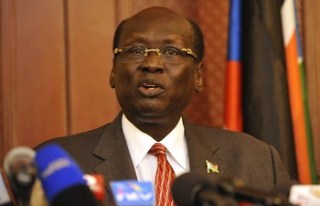Fears oil shutdown could cause environmental damage
June 9, 2013 (JUBA) – South Sudan’s information and broadcasting minister Barnaba Marial Benjamin has warned that an order by Sudanese president Omer Hassan al-Bashir to halt oil flows from the new nation could have serious environmental implications.

Marial said the cabinet meeting, chaired by president Salva Kiir Mayardit, was called to discuss Juba’s response to the development.
Bashir’s announcement on Saturday came in response to allegations the South is continuing to provide support to the Sudan Revolutionary Front (SRF) rebels fighting Khartoum on multiple fronts.
Speaking at a rally at the inauguration of an electricity plant in Shil’ab area in Khartoum state, Bashir vowed that: “The oil of South Sudan will not pass through Sudan ever again”.
However, South Sudan claims the order would violate an implementation matrix agreed in March for a series of cooperation agreements signed between the two countries last September.
“One of our observations from our studies was that the president Bashir did not observe the term of references of the [cooperation] agreement. There is a timeframe during which the party signatory to the agreement must formally notify the other party in writing in a period not less than 60 days. This did not happen and we think it is not right for president Bashir to just order [an] immediate stoppage of the oil flow without considering [the potential] environmental damage”, he said.
The proposed shutdown would come as a heavy blow to the agreements brokered by the African Union (AU) mediation team.
The March deal allowed for the resumption of oil exports the following month, which landlocked South Sudan suspended more than a year ago amid a dispute over transit fees with Sudan.
The stoppage had severe economic ramifications for both countries, particularly South Sudan, which relies on oil for 98% of its budget revenue.
Marial has warned that the enforcement of Bashir’s orders without prior consultation would have dire consequences, including potential tearing to the main pipeline from Palouge oilfield in Upper Nile state.
“The cooperation agreement was not just a bilateral agreement between the two countries. It was the agreement which involved different stakeholders. It involved the African Union (AU), the United Nations Security Council (UNSC) and oil companies who [hold] a stake. These people have to be involved if there are issues with the implementation”, Marial said at the press briefing.
“[A] decision to terminate the validity of this agreement cannot therefore be decided by one party because there [are] technical issues which can be done within a specific timeframe because this can cause the explosion of the pipeline. You have 700,000 barrels of oil already in the pipeline. This can cause environmental damage to the Nile which is used by other countries. This will not be the issue of Sudan and South Sudan alone if it happens. It requires technical attention to manage it properly so that it does not cause any damage”, he added.
SRF launched attacks on several Sudanese towns in April, briefly occupying the major town of Um Rawaba in North Kordofan state. They also took control of Abu-Kershola in South Kordofan for one month.
The rebels who control areas in Blue Nile state and South Kordofan have also vowed to carry out further attacks in order to topple the Khartoum regime.
(ST)
